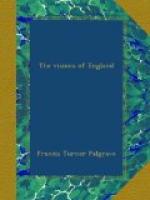The treasured ore; nor Alexander’s name
Know, nor fair Helen’s shame;
Or in his tent how Peleus’ wrathful son
Looks toward the sea, nor heeds
The towers of still-unconquer’d Ilion.
Belerium; The name given to the Land’s End by Diodorus, the Greek historical compiler. He describes the natives as hospitable and civilized. They mined tin, which was bought by traders and carried through Gaul to the south-east, and may, as suggested here, have been used in their armour by the warriors during the Homeric Siege of Troy.
PAULINUS AND EDWIN
627
The black-hair’d gaunt Paulinus
By ruddy Edwin stood:—
’Bow down, O King of Deira,
Before the holy Rood!
Cast forth thy demon idols,
And worship Christ our Lord!’
—But Edwin look’d and ponder’d,
And answer’d not a word.
Again the gaunt Paulinus
To ruddy Edwin spake:
’God offers life immortal
For His dear Son’s own sake!
Wilt thou not hear his message
Who bears the Keys and Sword?’
—But Edwin look’d and ponder’d,
And answer’d not a word.
Rose then a sage old warrior;
Was five-score winters old;
Whose beard from chin to girdle
Like one long snow-wreath roll’d:—
’At Yule-time in our chamber
We sit in warmth and light,
While cavern-black around us
Lies the grim mouth of Night.
’Athwart the room a sparrow
Darts from the open door:
Within the happy hearth-light
One red flash,—and no
more!
We see it born from darkness,
And into darkness go:—
So is our life, King Edwin!
Ah, that it should be so!
’But if this pale Paulinus
Have somewhat more to tell;
Some news of whence and whither,
And where the Soul may dwell:—
If on that outer darkness
The sun of Hope may shine;—
He makes life worth the living!
I take his God for mine!’
So spake the wise old warrior;
And all about him cried
‘Paulinus’ God hath conquer’d!
And he shall he our guide:—
For he makes life worth living,
Who brings this message plain,—
When our brief days are over,
That we shall live again.’
Paulinus was one of the four missionaries sent form Rome by Gregory the Great in 601. The marriage of Edwin, King of Northumbria, with Ethelburga, sister to Eadbald of Kent, opened Paulinus’ way to northern England. Bede, born less than fifty years after, has given an admirable narrative of Edwin’s conversion: which is very completely told in Bright’s Early English Church History, B. IV.
Deira, (from old-Welsh deifr, waters), then comprised Eastern Yorkshire from Tees to Humber. Goodmanham, where the meeting described was held, is some 23 miles from York.




